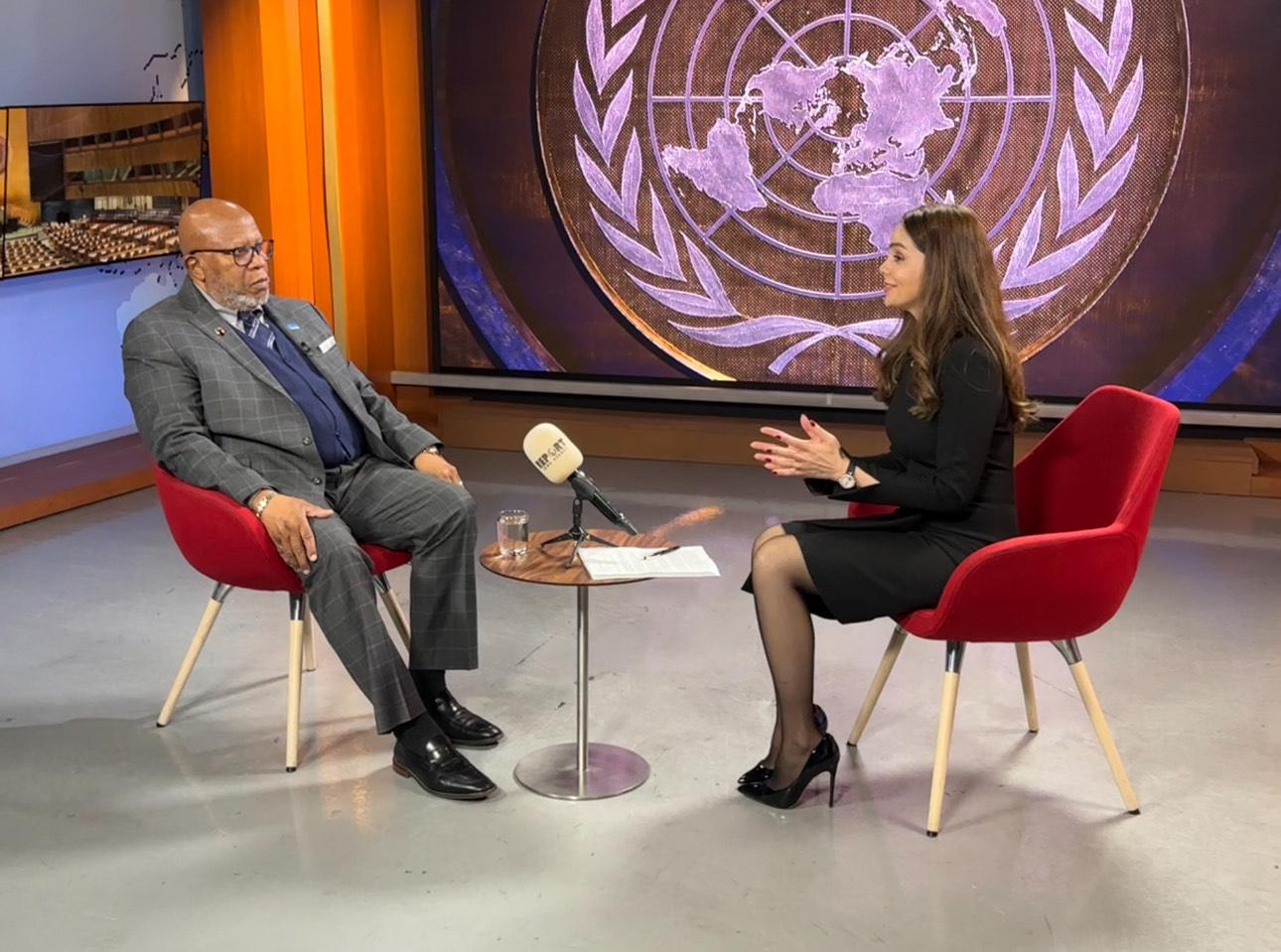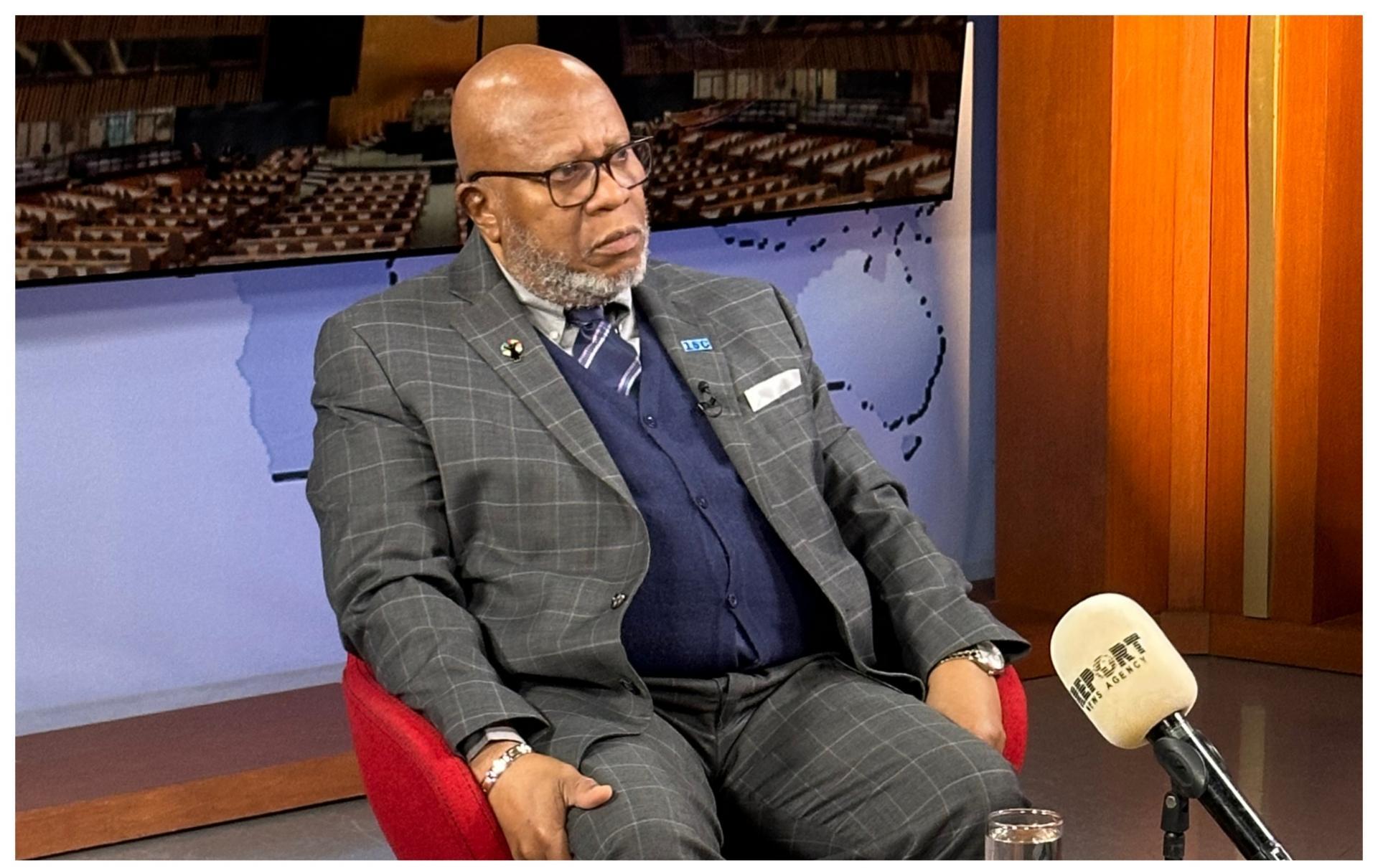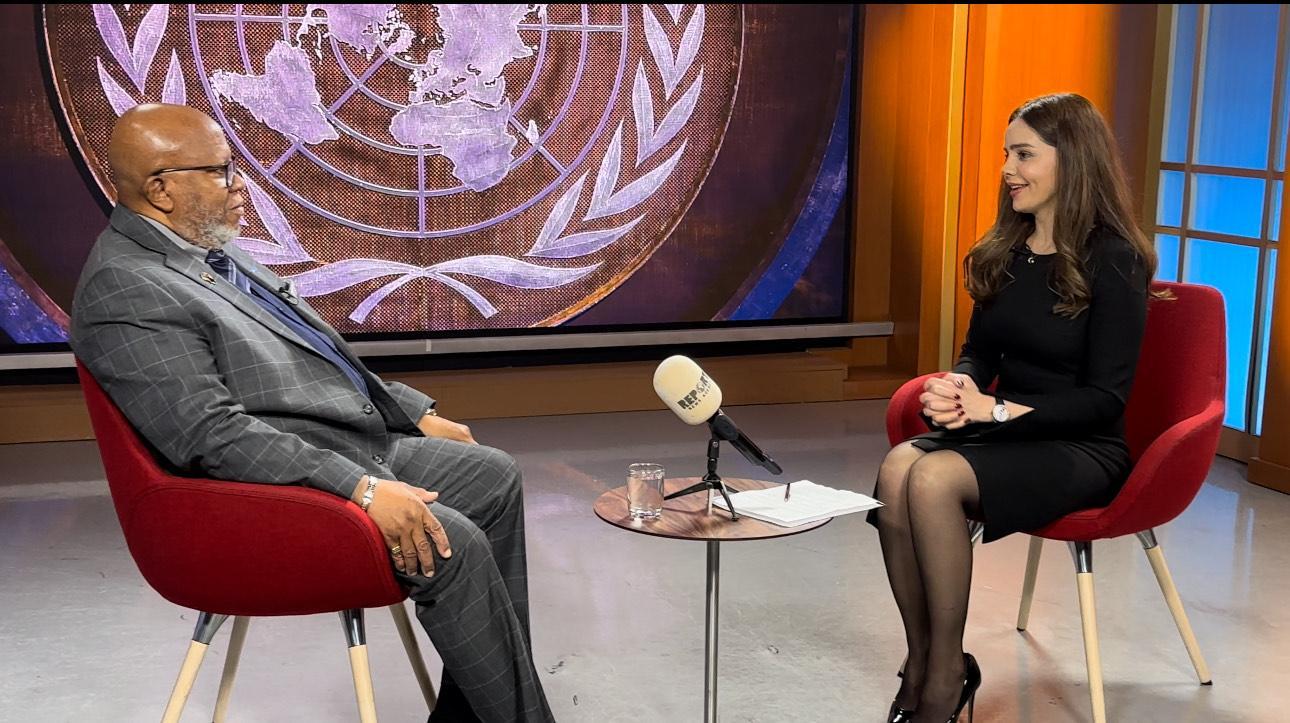UNGA President hopes COP29 in Azerbaijan to be successful and memorable INTERVIEW
Azerbaijan's chairmanship of the Non-Aligned Movement ("NAM") is set to conclude, poised to hand over its chairing role to Uganda at the 19th Summit of the Heads of State and Government of the Non-Aligned Movement scheduled for January 19–20, 2024. Under Azerbaijan's leadership since 2019, the NAM has made remarkable progress, becoming an impactful international player that amplifies the voice of its 120 member countries. Azerbaijan, during its chairmanship, initiated several measures to coordinate cooperation among member states, strengthen the values of multilateralism and international cooperation, and revitalize the institution.
Dennis Francis, the President of the 78th Session of the General Assembly, shared insights with the US Bureau of Report regarding Azerbaijan's accomplishments during its NAM presidency. Additionally, he addressed questions on many important issues related to Azerbaijan and the UN.
- Mr. President, thank you for giving me the opportunity today to ask my questions to you. Azerbaijan leaves behind a significant legacy as the NAM chair after four years. During its tenure, Azerbaijan played a crucial role in enhancing the movement's international standing, particularly by leading global efforts against the COVID-19 pandemic. How do you assess Azerbaijan's contribution to the NAM during its chairmanship?
- First of all, I would like to congratulate the government of Azerbaijan for its extraordinary leadership of the Non-Aligned Movement (NAM). I know that a lot of work has been done by the government of Azerbaijan to further strengthen the NAM, and we need a strong NAM in the system. To that end, I know that Azerbaijan has hosted a series of meetings, including the NAM Ministerial meeting last year in July in Baku, which was quite a success. So, kudos to the government of Azerbaijan as a strong partner and an effective leader of the Non-Aligned Movement.
- Mr. President, as you mentioned, under Azerbaijan's chairmanship, significant steps were taken for the further institutional development of the NAM. Initiatives such as the establishment of the NAM Parliamentary Network and the NAM Youth Organization were introduced. Additionally, President Ilham Aliyev proposed creating the NAM Women Platform. Could you please share your perspective on these developments?
- At this juncture in the 21st century, some buzzwords exist in the UN system. Two of them in particular are inclusion and transparency, that is bringing more and more people into the system, that they participate in the formulation of policies and in the making of decisions by the United Nations. It was very consistent with the philosophy of the UN, and this reinvigorated the working method of the UN. To engage with stakeholders across the spectrum in order to produce decisions and outcomes that adequately respond to the wishes and values of the people. In that regard, the government of Azerbaijan has been instrumental in establishing the NAM Parliamentary Network, which is an important and democratic development that engages parliamentarians and political leaders across the spectrum. As well as the Women's Network. As you may know, gender equality is an important dimension of the work of the UN and, in particular, of my presidency. You notice I'm wearing a pin with a woman. This is the UN Women's Pin, and it's set against the background of these sustainable development goals. Because we believe in the UN, women have an equal role to play in sustainable development. We are promoting that with great gusto and energy. The contribution that Azerbaijan has made in creating these new additional platforms for engagement, discussion, and refinement of important policy measures has added significant value to the thrust of stakeholder engagement in the UN.
-I remember your impactful speech at the II Baku Forum on Sustainable Development Goals (SDGs). That forum was a precise demonstration of Azerbaijan's attention to sustainability and its immense efforts to achieve UN Sustainable Development Goals. Moreover, there are a lot of infrastructure and green energy projects going on in different parts of Azerbaijan, including Karabakh. How do you assess the role of Azerbaijan in achieving the UN SDG goals?
- All member states of the United Nations need to heighten both their commitment and their performance in advancing rapidly towards the 2030 agenda. Unfortunately, progress toward the Sustainable Development Goals has been significantly slower than we had hoped for. But it is interesting and, in fact, exciting for me to learn that Azerbaijan has invested a lot of time and effort in the sort of greening of its territory. Its commitment to green development and sustainability will create dividends not just for Azerbaijan but for the entire global community. Because, as you know, the effects of climate change require all countries to contribute in proportion to their capacity. Azerbaijan's leadership in this area is, I think, welcome and timely given that the threats are becoming more and more strong and the evidence of climate change is becoming increasingly harsh. We've seen it, and we are seeing it with the last year, net 2023, being the hottest year on record. We're surpassing the previous record of 2016. It's time to act, and act decisively. I welcome and applaud Azerbaijan for its action on sustainability.




-In 2023, Azerbaijan was appointed to lead COP29 this year and is set to host the 13th World Urban Forum (WUF13) in Baku in 2026. Can we say that this reputation is related to Azerbaijan's success in the NAM?
- Of course, I am inclined to believe that it is. Let me congratulate Azerbaijan on this decision and its willingness to host COP29. It will be a very important meeting, as COP meetings always are. But yes, I think now Azerbaijan's performance as the Chair of the NAM would indefinitely have impacted the decision to bring the COP to Baku, and I hope that it will be a successful and memorable COP. Not just for developing countries, in particular. You may notice I am wearing a pin on my right lapel that says 1.5 degrees. This is extremely important for developing countries, in particular, but also for small island developing states (SIDS), to restrain the unrestrained growth of global temperatures above pre-industrial levels. We are all looking forward to the meeting at COP29, and I wish Azerbaijan success in achieving impactful results within COP29.
-There have been persistent demands to UN reform the Security Council's structure, particularly by expanding the number of permanent seats. Azerbaijan's President, Ilham Aliyev, has expressed his views about it. I quote: “One permanent seat should be given to the NAM, and the country holding the position of chair of the Movement should have this seat on a rotating basis.” He also supports the allocation of permanent seats for Africa in the Security Council. As a senior diplomat, what do you think is necessary for the United Nations to operate more effectively?
- You started the question by providing at least part of the answer. There is no doubt that the United Nations is challenged at this point. It's a very complex and complicated political environment in which we're operating. There are wars taking place, and there are conflicts in Africa and other places. We have had pandemics, and the economy is showing signs of faltering. We have had supply chain issues, we have had inflation, and it is a very complex political environment that we are facing. But the fact remains that we can't postpone taking action on these issues. The buck stops with us, and so part of what we have to do is to reconsolidate our efforts, build and rebuild our solidarity, and, in order to take the sometimes difficult decisions that are required, to bring order back into the system. One of the things that the United Nations hasn't been doing is the question of reform of the UN itself. It's not just the reform of the Security Council, its reform of the Economic and Social Council, and the reinvigoration of the United Nations General Assembly. But perhaps the headliner in all of this, insofar as the public is concerned, is the reform of the Security Council, there is an ongoing process. Significant work has been done, and some progress has been made. That delegations better understand each other's positions. But Security Council river reform alone will not fix the problems. There is a need to be as an international community. We all need to recommit to the fundamental principles and precepts of the United Nations.

We all must emphasize and accept the preeminence of international law. All states must respect and abide by international law, just as we need to respect and abide by international human rights law and international humanitarian law. We need to build a genuine spirit of cooperation and collaboration and rebuild solidarity so that when we act, we act in concert, secure in the knowledge that the actions that we are taking are benefiting the people that we were sent here to serve. That is the 8 billion people who comprise the international community and who depend on us to help them address the problems and issues that compound their daily lives and that affect their welfare and well-being. We are in that mode of reforming the Council as well as revitalization of the General Assembly. This is a process; it's not an event. I have to say this in order to make it clear that your listeners, the people of Azerbaijan, should not expect that the council will be reformed next week or next month. This is a process that is extremely important and that will require deliberate, careful, and meticulous decision-making. Because we've only got one chance rarely to get it right. Therefore, we need to be cautious, pragmatic, and sensitive at the same time when conducting security consultations.
-Mr. President, we have seen that some Security Council resolutions have been implemented within days, but some of them have not. For instance, the UN Security Council adopted four resolutions in 1993 that confirmed the occupation of Azerbaijani territories by Armenian armed forces and demanded the immediate and unconditional withdrawal of Armenian troops from Azerbaijan. Besides, the UN General Assembly adopted a resolution in 2008 that reiterated Azerbaijan's territorial integrity. However, these resolutions weren't implemented for nearly 30 years until Azerbaijan itself restored its territorial integrity and historical justice by military-political means and enforced the Security Council resolutions' implementation. This approach raises questions about the UN's impartiality. Do you agree with that?
- Well, a little bit of the background resolutions of the Security Council are ipso facto law. They constitute international law, and as members of the United Nations, member states are obliged to uphold them. Resolutions of the General Assembly do not constitute law. They are not unimportant because they express the general will of the international community of 193 states, and therefore, they carry a certain weight or political influence. So, there's a distinction between the two. I returned to the initial point I made a while ago, which is that we, the member states of the United Nations, must recommit to accepting the preeminence of international law to following and abiding by international law because once the Security Council delivers a resolution, that resolution is the law and all member states are obliged to follow it. If we do that, there will be no question or doubt as to the universality of the importance of Security Council resolutions. The problems arise when states that are the object of those resolutions refuse to implement them. But we should not prejudge the work of the Security Council when other states, who may be impacted by resolutions, follow those resolutions. It's a question of political will and honoring commitments given upon joining the United Nations. The fundamental principles, obligations, and responsibilities are outlined in detail in the charter. When we accept them upon membership, acceptance must mean adherence to and following the law. Those resolutions produced by the Council have the force of law. All our lives would be made enormously easier if all member states would honor their commitments under international law. That is what a rule-based system is intended to do: create predictability, stability, calm, and reassurance. But a violation of the law would constitute a denial of one's responsibility.
-Mine Action highlights the enduring legacies of war in Azerbaijan, with civilians and military personnel facing the threat of mine explosions almost daily. Supporting national mine action efforts remains a top priority for the UN in Azerbaijan. Do you plan to initiate a session addressing this environmental disaster globally?
- Let me extend to you and the people of Azerbaijan my condolences on the loss of your two former colleagues. For many years, I was a permanent representative to the UN in Geneva, and I would walk by the chair. You must have seen the three-legged chair. It's a very powerful symbol of the effects of mines left after many years of war. It's a devastating thing. I would hope that action is taken over time to address this problem. We have no specific opportunity in the agenda of the General Assembly this year to have a session on my inaction. However, we are aware of the damage caused by mines in the region and the importance of taking action to eliminate it.

-How do you see the perspectives on the normalization process between Azerbaijan and Armenia? How can the GA promote the process?
- I read with great satisfaction and pleasure that there is a new atmosphere of conciliation, dialogue, and cooperation between Azerbaijan and Armenia. I think this is exactly the right direction that both countries need to go in. We cannot place our faith in aggression to resolve conflicts and disputes. Violence does not produce credible outcomes. Only discussion and dialogue in negotiations and understanding each other's position civilly and respectfully have the potential to create stable, long-lasting outcomes in which both sides are happy. I welcome the normalization process between Azerbaijan and Armenia, and I congratulate both countries on that initiative.
- Your vision statement emphasizes “Peace, Prosperity, Progress, and Sustainability.” We are a quarter of the way into your presidency. What kind of achievement have you had, and what adjustments are you making in terms of what you feel can be done in a year?
- I could say that we have done the work that we set out to do in the first part of the session. We have tried our best to fulfill the demand and realize the programs that we have identified. For the balance of the year, we intend to be very, very busy. From the 15th to the 19th of April, we will be organizing a week called Sustainability Week. This is a high-level meeting on tourism, transport, energy, and debt. It will be a high-level meeting, which we hope will feed into the turbocharged achievement of the Sustainable Development Goals because that remains our primary objective from the point of view of sustainable development: getting the goals completed by 2030. In addition to that, we are working very hard. In fact, earlier today an informal plenary meeting was held in which the General Assembly gave its assent to the draft decision that I had placed before them for the convening of a high-level meeting on the 25th of September 2024 to address the question of sea level rise, which is impacting a large number of states on a cross-regional basis, but particularly the small island developing states (SIDS). In that regard, those in the Pacific are particularly heavily impacted. There are lots of events taking place that will keep us busy, but of course, the most important thing would be the Summit of the Future, which will take place in September of next year and which is going to be the primary focus of the work of the presidency going forward as these negotiations move into high gear. It will be a very busy, productive, and demanding ongoing session of the 78th session of the General Assembly.








